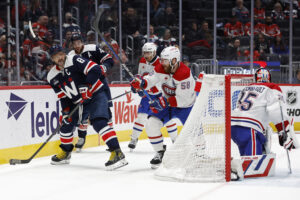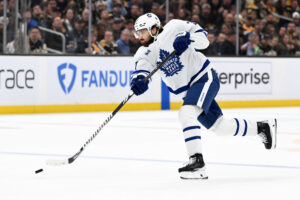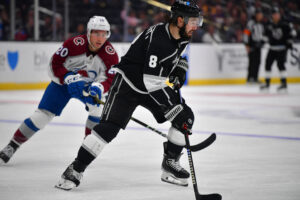The Starting Six series comes to you to dive into the best player at each position all-time for every organization. The biggest and best at each position, with the most memorable moments in franchise history. Here is the Montreal Canadiens all-time lineup.
Starting Six: Montreal Canadiens All-Time Lineup
The Montreal Canadiens history is the richest in all of hockey. In its 108 years of existence, the Canadiens have had many tremendous players who have led them to their 24 Stanley Cups.
Having such a rich history gives so many options to make the franchise’s all-time team. There are players from each era of the NHL that could fit onto the list. The Canadiens have had many heroes in its rich history, having won 24 Stanley Cups. However, the list must come down to the best by each position in Habs history
Center: Jean Beliveau (1950-51, 1952-71)
When thinking about the Montreal Canadiens history one of the most famous names is Jean Beliveau. Beliveau was among the leagues best players of his time, and he helped the Canadiens win 10 Stanley Cups in his 20-year career with the organization. He also served as captain for five of those Stanley Cups.
Beliveau had all the skills that made a successful hockey player. He was 6’4″ but could skate like a player six inches shorter than him. He was best known as a playmaker throughout his career, yet he still managed to score 507 goals in his career. His 507 goals is the third most in Habs history. Beliveau is the second all-time leader in points behind Guy Lafleur, with 1,219. As for the playoffs, he is the team’s all-time leader in points with 176. If the two totals were combined Beliveau has the most points of all-time in a Habs uniform, beating out Lafleur by 16 points.
Beliveau’s accolades include an Art Ross trophy in 1956, and two Hart trophies won in 1956 and 1964. He also became the first recipient of the Conn Smythe trophy as the MVP of the playoffs when he won it in 1965.
However, Beliveau is also on this list for his leadership skills as well as on ice. Beliveau has won more Stanley Cups as captain than any other player in league history. He was also inducted to the Hockey Hall of Fame in 1972, a year after his retirement meaning the three-year wait period was waived. It is a no-brainer that “Le gros Bill” is the best centre in Habs history.
Left Wing: Dickie Moore (1951-63)
Of all the positions in Habs history, left wing was the weakest. However, that doesn’t mean that Dickie Moore doesn’t belong on this list. It’s just that he has less competition for the spot on this team. Moore was a key part to the five consecutive Stanley Cup team of the late 1950’s. However, he does often get unnoticed after having played with players like Jean Beliveau, Maurice and Henri Richard who seemingly were the more known stars of the late 50’s Canadiens.
Nonetheless, Moore was actually the most successful offensively in terms of individual seasons. In both the 1957-58 and 1958-59 seasons Moore won the Art Ross Trophy for having scored the most points. Something the other three did a combined once. This included setting a record for most points in a season during the 1958-59 season with 96. It has since been broken, but at the time it was a big accomplishment. During the 1958-59 playoffs he was the teams leading scorer as well. His overall game consisted of a mix of goal scoring and playmaking which helped him tremendously as a player in the scoring races. While his reign only lasted two years, Moore proved to be a star.
Moore won six Stanley Cups during his 13-year career with the Canadiens. Even after his breakout seasons Moore remained a star outside the spotlight for the Canadiens until his retirement in 1963. He returned to play for the Toronto Maple Leafs and St. Louis Blues before calling it quits for good in 1968. Moore was inducted into the Hockey Hall of Fame in 1974. Today, he remains the only left wing in Habs history to have his number retired.
Right Wing: Maurice Richard (1942-60)
It is well known that the title of best Montreal Canadien of all-time goes to Maurice Richard. Often referred to as “The Rocket”, Richard was seen by many as the greatest player to ever live up until the emergence of Bobby Orr. Richard will always be known best as being the first player to score 50 goals in a season. He scored 50 in 50 games back in 1944-45. The Rocket was a prolific scorer and first of his kind. He led the league in goals four times in his 18-year career. Richard became the first player to score 500 goals in a career as well. He ended his career on 544 goals, which is still most by a Montreal Canadien today.
Richard wasn’t only effective in the scoring aspect of the game, but was also known as a tough customer. He would dish out the punishment as well as he could take it. At one point he beat up the toughest player in the league Bob Dill. His temper also got him in trouble, resulting in a remainder of the season suspension in 1955 after hitting a referee. As a result, Richard was never able to win a scoring title for most points.
Despite never winning a scoring title, Richard did win a Hart trophy for most valuable player in 1947. He also won eight Stanley Cups, including the five at the end of the 1950’s. He also was captain of the last four cups. Richard was inducted into the Hockey Hall of Fame in 1961.
Defenseman: Doug Harvey (1947-61)
Many believe that Bobby Orr was the defenseman that made going end-to-end famous, but Doug Harvey was the first. Playing in a time where defenseman were all stay at home, Harvey changed the way the game was played for defensemen.
During his career, Harvey won seven Norris Trophies in an eight year span, including six with the Canadiens. The other time it belonged to defensive partner Tom Johnson in 1959. It was the most at the time until Orr surpassed that total by winning eight. However, Harvey was a pioneer for defensemen everywhere and he made it possible for Orr and many others to start moving the puck. While Harvey didn’t score much, he brought help on offense for his teams forwards by bringing the puck up ice.
He played a major role in helping the Canadiens win the five consecutive Stanley Cups in the late 1950’s. Harvey regularly was a quarterback on a Habs powerplay that would often score twice on the man advantage. He played a strong game on both ends of the ice and he was considered to be the best defenseman of his time. He was actually the founder of the famous Savardian Spin-a-rama that both Serge Savard and Denis Savard were often found doing.
Doug Harvey went on to win six Stanley Cups during his tenure with the Canadiens. Harvey was inducted into the Hockey Hall of Fame in 1973.
Defenseman: Larry Robinson (1972-89)
Larry Robinson was the type of defenseman that could do everything. He could dish out some hits and play physical if that was what was asked of him. This was the case in the 1976 Stanley Cup playoffs when he outmuscled the Broadstreet Bullies of the Philadelphia Flyers. It was the type of play that got Robinson noticed around the NHL.
He was a major part in the saying that during the late 1970’s, the Montreal Canadiens could play any style and win. His offensive game was just as good, as his career high in points was 89 during the 1976-77 season. During that season, the Canadiens put up the best season in history to date, with a 60-8-12 record. Robinson played a big role patrolling the blueline as part of the big three with Serge Savard and Guy Lapointe. However, it was Robinson that was the best of the three. Savard was used more as a shutdown stay at home defenseman, whereas Lapointe was used for offense. Despite that fact, Robinson was able to do both at the same level as the two others.
Robinson did it all and was the leader of very strong defensive core in the late 1970’s. Later in his career, Robinson served as a mentor to help the younger defensemen transition in the NHL.
Like Harvey, Robinson won six Stanley Cups with the Canadiens, including in 1978 when he won the Conn Smythe as the MVP of the playoffs. He also won the Norris Trophy twice. Robinson was inducted into the Hockey Hall of Fame in 1995.
Goaltender: Ken Dryden (1970-73, 1974-79)
Some may argue that Jacques Plante is the best goalie in Habs history, but Ken Dryden accomplished just as much in less time. Dryden won six Stanley Cups with the Canadiens in the eight years that he played in the NHL. This includes Dryden winning the Conn Smythe before his eligible rookie season in 1971. He then went on to win the Calder Trophy as best rookie the following year.
From the very beginning he stood out and helped the Canadiens to be a powerhouse throughout the 1970’s. He won five Vezina Trophies as well in his short NHL career. He may have had a strong team in front of him, but he deserved the credit he got for standing strong in net. Without him, the Canadiens weren’t as strong. A good example is the year he held out during the 1973-74 season, the Habs allowed 56 more goals than the previous year.
Dryden never lost more than 10 games in any given season. His career goals-against-average is a solid 2.24. Dryden had a career save percentage of .921 in a time when scoring was much higher than it is today. Dryden was inducted into the Hockey Hall of Fame in 1983.
There will always be a debate on who the greatest goaltender in Habs history is, but due to his limited time and amazing numbers Dryden takes it here.
Honourable mentions: Guy Lafleur (1971-85) and Howie Morenz (1923-34, 1936-37)
Guy Lafleur can arguably be the second best player in Montreal Canadiens history, but he didn’t make the Montreal Canadiens all-time lineup because he was a right wing, therefor competing with Maurice Richard. Lafleur was an offensive dynamo who lead the charge during the late the 1970’s dynasty. He holds the record for most goals (60) and points (136) in a season by a Montreal Canadien. He helped the Canadiens capture five Stanley Cups in his 14 years with the club. Lafleur was a special player that the Canadiens haven’t seen the likes of since he retired in 1985. He was inducted into the Hockey Hall of Fame in 1988.
Howie Morenz played in an era that most fans don’t know much about. However, Morenz was the NHL’s first ever superstar. It was said that, despite the fact that he played for a Canadian team, he brought American interest in hockey. Essentially, Morenz was a moneymaker for the game of hockey and kept fans interested during the Great Depression of the 1930’s. He led the Montreal Canadiens to three Stanley Cups with his fierce competitive play. Despite all his accomplishments, his life came to a tragic end after suffering a blood clot from a broken leg he suffered in his last hockey game. Morenz lived on as a legend and was inducted into the Hockey Hall of Fame in 1945.
Main Photo:






